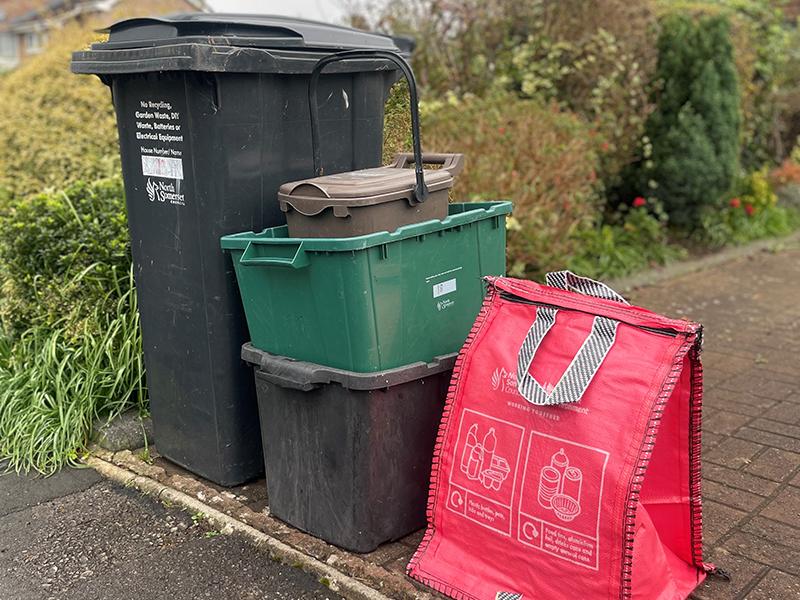For most households, black bin collections will switch from fortnightly to three-weekly in June, and a wider range of recycling materials will be collected each week - including plastic bags and soft plastic wrapping.
Most people’s collection day will change in June to increase the efficiency of collections, reduce carbon emissions, and improve reliability of the service.
Information packs will be sent out in May before the changes begin to outline each household’s new arrangements.
Three-weekly black bin collections
Increasing the range of recycling we collect and switching to three-weekly black bin collections will cover the cost of all collections, plus generate savings of more than £1m a year to help fund vital local services.
An analysis of black bin waste in North Somerset found that almost half (45 per cent) could have been recycled. Over a quarter of the bin (27 per cent) was food waste and almost half of this was unopened food still in its packaging.
Several other councils in the UK already successfully offer a three-weekly bin collection, including Somerset, East Devon and Mid Devon.
However, not all properties are suitable for a less frequent black bin collection.
Those with communal collections and many town centre properties will keep their current frequency, although it is likely the collection day will still change.
The move to three-weekly black bin collections is in-line with our recycling and waste strategy, which aims to reduce non-recycled waste and reach a recycling rate of 70 per cent by 2030.
Red recycling bags
New red recycling bags are currently being delivered to households across the area and can be used straight away in addition to your green boxes.
These red bags provide extra space for more recycling and full instructions are included.
Use the red bag for your plastic bottles, pots, tubs, trays and metal packaging such as tins, cans, foil and empty aerosols.
These red bags are weighted to stop them blowing away and are bigger than recycling boxes, with 90-litre capacity compared to the 55-litre green boxes.
Plastic bags and soft plastic wrapping
We’re the first local council in the UK to collect and compact plastic bags and soft plastic wrapping at the kerbside as part of a weekly household recycling service.
These materials, such as crisp packets, film lids, plastic pouches and vegetable packaging, make up about 10 per cent of black bin contents.
When we start collecting plastic bags and soft plastic wrapping in June, these should be bagged using one of the carrier bags or bread bags you want to recycle.
Squash the plastic right down to squeeze all the air out, tie with a knot, and then put in your recycling box with your glass bottles and jars.
There will be lots more information about recycling plastic bags and soft plastic wrapping in the information packs being sent out in May.
Bigger compartments
Bigger compartments on the recycling vehicles will mean more space for recycling items such as batteries, clothes, small electrical items and vapes, so improve the reliability of these items being collected.
App
A new app launches later this month to help you keep track of collections.
You’ll be able to set up reminders for when to put your bins out, find out more about what and how to recycle, receive real-time updates about any changes to recycling and waste collections, and find out about other council services.
Additional support
Additional support is available for anyone who thinks they’ll struggle with the changes.
Waste minimisation officers are available to advise people who may have concerns and are looking for additional support to recycle as much as they can.
Request this through our website.
People who may struggle with a three-weekly black bin collection due to medical needs, children in disposable nappies or a larger household may qualify for additional capacity for their rubbish.
Discover the magic of composting
Could you join a team of volunteers to help spread the word about the benefits of composting at home?
Since launching the master composters scheme in 2022, more than 50 people have become volunteers to promote the magic of composting in their local communities.
The scheme’s mission is to help everyone reduce food and garden waste by composting at home as much as possible.
Why compost at home?
- It reduces waste and emissions
- is free and boosts soil health
- it protects endangered peatlands.
You’ll help spread the word about composting at farmers’ markets, community fairs, gardening clubs, and even primary school workshops.
Volunteers have expert training, free Garden Organic membership, and ongoing support from their local co-ordinator.
The next training takes place at Yeo Valley Organic Gardens in Blagdon on Wednesday 7 May. Sign up online by next Friday (18 April).

